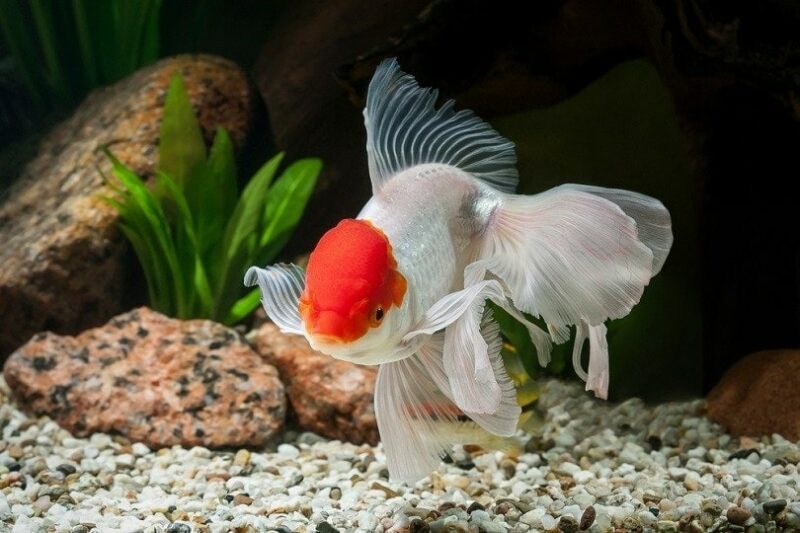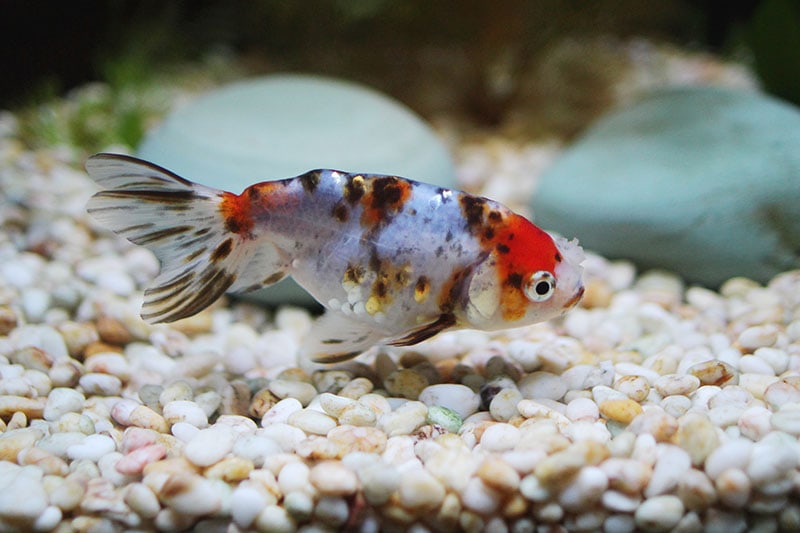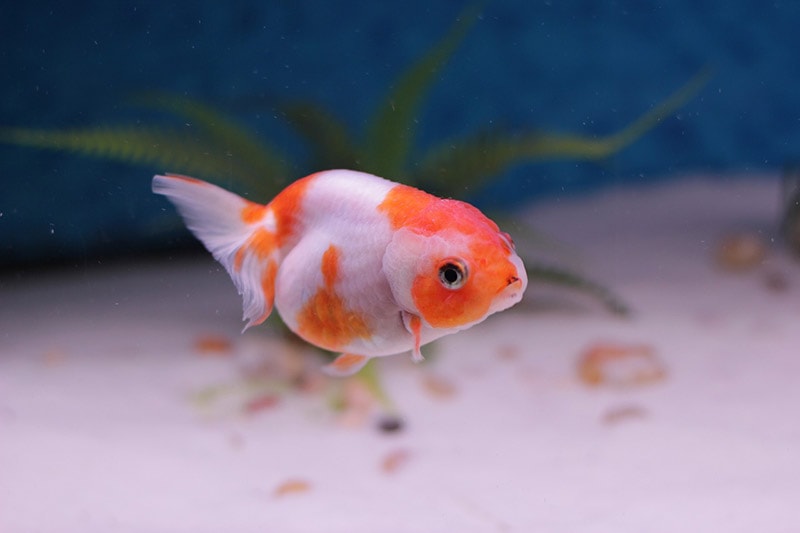7 Causes of Aggressive Goldfish Behavior & How to Stop It
Updated on

Click to Skip Ahead
Goldfish are usually known as very docile and social fish, but some goldfish break the mold. Aggressive and bullying behaviors can be stressful for all of the inhabitants in the tank, including the bully itself. Aggressive behaviors can lead to injuries, illness, and even death, so it’s essential to identify the cause of the aggression and work to remedy it. Let’s talk about some of the most common causes of aggression in goldfish.
Fundamentals of Aggression In Fish
Aggression is often described as a social feature which involves any behavior that is associated with threats, attacks, or defensive responses among an individual or a group. Almost all vertebrates express some type of aggression, and fish are no exception to this rule.
Fish are fascinating in the sense that they display a very wide range of aggressive behaviors. Though the signs of aggression in fish are well documented, the physiological basis of aggression in fish is still poorly understood and an area where research is unfortunately lacking.
Many theories and hypotheses exist which attempt to explain aggression in fish, however, very few of these theories or hypotheses have been definitively proven, and many observations in research have not been replicable in other research endeavors. This means that overall, much remains to be discovered about the precise reasons for aggression and therefore, knowledge of a remedy to the problem of aggression is also somewhat guess-based, at best.
Though it is often believed that aggression in fish requires vision as a “prompt” (for example, a fish must see a threat to respond), recent studies also postulate that fish might also be relying on chemical or pheromone based cues from their environment.
For most pet owners, the sight of their goldfish suddenly turning on each other and other tank inhabitants can definitely be worrying. Below are some reasons why your goldfish might be displaying such behavior, however, it is important to note that current research on some of these causes isn’t definitive or conclusive.

The 7 Causes For Aggression in Goldfish
1. Overcrowding
It’s perfectly normal to want to fill your tank with as many beautiful and interesting fish as you can find, but this is rarely the right thing to do for the health of your fish. An overcrowded tank can lead to too little space for each fish, sometimes leading to aggression. It can also lead to a decline in water quality, thanks to the extremely high bioload that each goldfish will add to your tank. In such a scenario, the lack of resources (as so many fish might spontaneously compete for food) might be the culprit.
If your tank is only slightly overstocked, then you may be able to simply upgrade your filter to a strong filtration system. However, if your tank is significantly overstocked and your fish all have very little space to themselves, then splitting your fish out into multiple tanks or rehoming some fish are your best options.
2. Small Environment
Overcrowding is one issue, but keeping your goldfish in a tank that is too small is a problem all on its own. While people are becoming more educated about the needs of fish, it’s not unusual for some people to think that fish bowls and small tanks are appropriate for their goldfish.
Goldfish that are kept in too little space can become stressed. If they feel like they lack space, they will often turn aggressive. In most fish species, the larger fish often end up as the aggressors in this scenario. In some cases, they may lash out at tank mates simply because of the stress of having too little space, and in other cases, aggression may be the result of competition for free space.

3. Underfeeding
It can be very easy to overfeed goldfish, thanks to their tendency to beg for food. Overfeeding creates its own set of problems, but underfeeding your goldfish can cause some equally bad issues. Underfeeding can lead to your fish feeling desperate for food. Desperation for food can lead to aggression if your fish feels like their food source is being threatened. It can also cause aggression if your fish is simply trying to be the first in line for a meal, regardless of who’s in the way.
If you think underfeeding may be the cause of your fish’s aggression, then you may need to increase the frequency or amount that you’re feeding. In general, you should feed your goldfish as much as they can eat in 2 –5 minutes once or twice daily.
Most experienced hobbyists are able to calculate their fish’s feed requirements based on the size of the fish, the water temperature, and the nutritional analysis of the food. However, an acceptable alternative to these calculations is the advice that you should feed your goldfish as much as they can eat in 2 – 5 minutes once or twice daily. It is best to talk to an experienced aquatic veterinarian to come up with a meal plan that suits your fish.
4. Breeding
The breeding behaviors of goldfish can definitely appear to be aggressive, but it’s also not uncommon for both males and females to show aggression during this time. When attempting to spawn, male goldies will chase females, often nipping or nosing at their back end in an effort to get the female to release eggs. This chase can go on for hours, often occurring multiple days in a row. It is believed that the pheromones the female goldfish release allows males to recognize that they are ready for spawn. In turn, they relentlessly chase the females around.
Experienced fish keepers are no strangers to the fact that breeding goldfish is very stressful for female goldfish, and a prized pet can definitely suffer from injuries throughout the process. Therefore, it is important to thoroughly consider and research the fundamentals of breeding goldfish before attempting to do so.

5. Stress
Goldfish can experience stress for many reasons, including almost all of the reasons listed above. Stress in fish can decrease their immune system function, leading to illness. It can also make them more prone to infections and injuries due to poor water quality. Not only can stress physically impact your fish, but it can also impact them physiologically.
A stressed fish is more likely to exhibit unusual behaviors, including hiding, bottom sitting, inappetence, and aggression. To combat stress, you have to identify and remedy the cause of the stress. In some cases, there may be multiple factors compounding your goldfish’s stress levels.
6. Illness
We’ve all experienced a situation where we didn’t feel well and started to lash out at the people around us. A theory postulates that this may happen to fish as well. When a goldfish is ill, they may begin to show some aggressive behaviors toward their tank mates. This aggression may be related to simply not feeling well, or it may be because the stress of the illness has caused your fish to feel threatened, leading to them reacting aggressively to other fish that get close to them.
When dealing with illness in your goldfish, medications may be necessary, but you should also investigate the quality of your water. Poor water quality is the top cause of illnesses in aquarium fish. In addition, medication of any sort is typically ineffective if water quality issues are not remedied promptly.

7. Inappropriate Tank Mates
Some people believe that goldfish shouldn’t be kept with any other fish due to their high bioload and tendency to eat smaller tank mates. There are a few tank mates that can be suitable for goldfish, though. Some experienced fishkeepers have successfully housed goldfish with other inhabitants, including white cloud mountain minnows and weather loaches (also known as pond loaches). However, there are a huge number of fish in the aquarium trade that are not suitable tank mates. Tropical fish are poor tank mates because their water parameter needs differ from those of goldfish. Some fish shouldn’t be kept with goldfish due to the risk of aggression, though.
Cichlids, for example, are known for their aggressive and territorial behaviors. When kept with goldfish, your goldfish may be threatened by the behavior of the tank mates, leading to reactionary and defensive aggression. In such a scenario, the aggression displayed by your goldfish is likely due to a defensive response. If this is the case, then you need to reconsider the stocking of your tank and rehome the inappropriate tank mates to another tank or home.
Conclusion
Aggression is generally considered to be an unusual behavior in goldfish, so it’s important that you not overlook this behavior. If your goldfish is behaving aggressively, then it’s likely that there is an underlying problem leading to aggression. Investigate your tank setup, tank mates, water quality, feeding schedule, and general environment in and around the tank to determine why your fish is showing aggression.
Remember that it’s always best to consult your aquatic or exotic veterinarian for further information, as they may be able to help you ascertain why your goldfish are acting in an undesirable manner.
See Also:
Featured Image Credit: dien, Shutterstock














